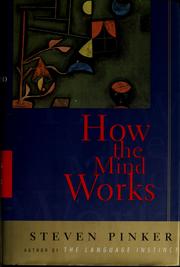Check nearby libraries
Buy this book

In this book, Steven Pinker explains what the mind is, how it evolved, and how it allows us to see, think, feel, laugh, interact, enjoy the arts, and ponder the mysteries of life. How the Mind Works explains many of the imponderables of everyday life. Why does a face look more attractive with makeup? How do "Magic-Eye" 3-D stereograms work? Why do we feel that a run of heads makes the coin more likely to land tails? Why is the thought of eating worms disgusting? Why do men challenge each other to duels and murder their ex-wives? Why are children bratty? Why do fools fall in love? Why are we soothed by paintings and music? And why do puzzles like the self, free will, and consciousness leave us dizzy? The arguments in the book are as bold as its title. Pinker rehabilitates unfashionable ideas, such as that the mind is a computer and that human nature was shaped by natural selection. And he challenges fashionable ones, such as that passionate emotions are irrational, that parents socialize their children, that creativity springs from the unconscious, that nature is good and modern society corrupting, and that art and religion are expressions of our higher spiritual yearnings.
Check nearby libraries
Buy this book

Previews available in: Polish English
Subjects
Nonfiction, Philosophy, Neuropsychology, Psychology, Cognitive neuroscience, Natural selection, Human evolution, Evolution, Cognition, Selection (Genetics), Physiology, Kognitive Psychologie, Neurosciences cognitives, Genetic Selection, Bewusstsein, Sélection naturelle, Neuropsychologie, Évolution, Kognitionswissenschaft, Cognitieve processen, Psychologie, Geist, Gehirn, Homme, Kognitiver Prozess, Biological Evolution, Fizjologia, Filozofia umysłu, Ewolucja, Mózg, Poznanie, Umysł, Teoria, Neuropsychologia, Science| Edition | Availability |
|---|---|
| 01 |
zzzz
|
|
02
Wie das Denken im Kopf entsteht
Apr 01, 2012, FISCHER Taschenbuch
paperback
3596192757 9783596192755
|
zzzz
|
| 03 |
zzzz
|
| 04 |
zzzz
|
|
05
How the Mind Works
January 2000, Audio Scholar, Brand: Audio Scholar
Audio cassette
in English
- Abridged edition
1879557509 9781879557505
|
zzzz
|
| 06 |
zzzz
|
|
07
How the Mind Works (Penguin Press Science)
February 4, 1999, Penguin Books Ltd
0140244913 9780140244915
|
zzzz
|
| 08 |
zzzz
|
| 09 |
eeee
|
| 10 |
zzzz
|
|
11
Wie das Denken im Kopf entsteht.
September 1, 1998, Kindler Verlag GmbH
Hardcover
3463403412 9783463403410
|
zzzz
|
| 12 |
aaaa
|
| 13 |
eeee
|
Book Details
Table of Contents
Edition Notes
Includes bibliographical references (p. 589-625) and index.
Classifications
The Physical Object
ID Numbers
Source records
Internet Archive item recordInternet Archive item record
marc_openlibraries_phillipsacademy MARC record
Internet Archive item record
Better World Books record
Library of Congress MARC record
Internet Archive item record
Promise Item
marc_nuls MARC record
marc_columbia MARC record
Work Description
"Presented with extraordinary lucidity, cogency and panache...Powerful and gripping...To have read [the book] is to have consulted a first draft of the structural plan of the human psyche...a glittering tour de force" - Spectator "Why do memories fade? Why do we lose our tempers? Why do fools fall in love? Pinker's objective in this erudite account is to explore the nature and history of the human mind...He explores computations and evolutions, and then considers how the mind lets us "see, think, feel, interact, and pursue higher callings like art, religion and philosophy"" - Sunday Times
Community Reviews (0)
Feedback?History
- Created July 8, 2011
- 16 revisions
Wikipedia citation
×CloseCopy and paste this code into your Wikipedia page. Need help?
| October 10, 2024 | Edited by Res Cogitans | Edited without comment. |
| July 12, 2024 | Edited by MARC Bot | import existing book |
| March 7, 2023 | Edited by MARC Bot | import existing book |
| January 17, 2023 | Edited by ImportBot | import existing book |
| July 8, 2011 | Created by ImportBot | Imported from Internet Archive item record |






















